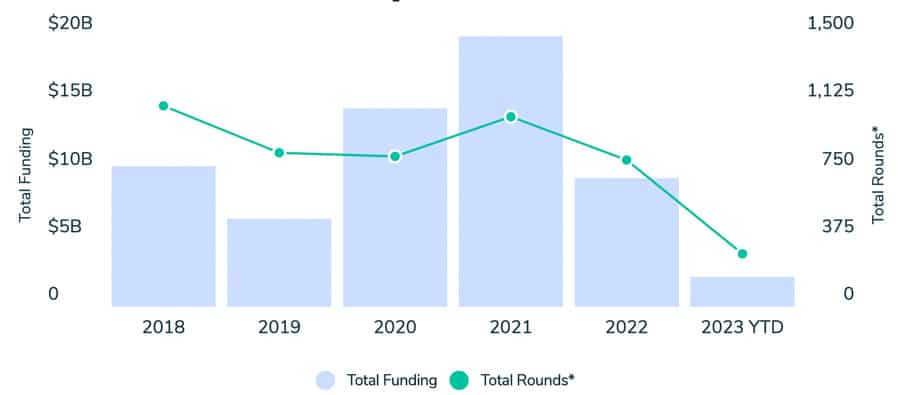EdTech investment cooling in 2023 but growth outlook remains strong
- The pace of venture investments in the global EdTEch sector has slowed considerably over the last two years
- However, education technology is still projected to be a major growth driver in the global education market through the rest of this decade
- AI, mobile learning, tutoring, and data analytics are among some of the most important focal points in EdTech today
The flow of venture funding to EdTech startups slowed noticeably in 2022 and the trend is extending into 2023. Crunchbase is reporting that 2023 has not yet seen a single funding round of US$100 million+, whereas there were more than 60 such investments globally over 2021 and 2022.
More broadly, venture funding in the sector has been on a sharp two-year decline, after a recent-year peak in 2021. Total funding committed year-to-date August 2023 is down roughly two-thirds compared to the same period in 2022.

"While global venture funding is down across the board, education has been a bit harder-hit than most other sectors," adds Crunchbase's Joanna Glasner. "Potential exacerbating issues include high-profile disappointments in the edtech unicorn crowd, some reversal of the pandemic-driven boost in online learning, and a weak exit environment."
Even a couple of years ago, a number of high-profile EdTech players went through splashy and successful Initial Public Offerings (IPOs), including Coursera and Duolingo. But there have been few notable transitions from venture to public financing since.
HolonIQ maintains a list of EdTech unicorns (companies with a valuation of US$1 billion or more), and it is showing the effects of a more conservative investment climate as well. Valuations have been adjusted downward for several firms this year, to the point that 12 companies fell off the HolonIQ list during a January 2023 valuation review. Even so, the current edition of the unicorn list (as of 1 March 2023) contains 30 companies from around the world, collectively valued at US$89 billion.
"Taking a breath before a powerful re-boost"
The venture capital world may be taking a gap year this year, but the overall outlook for the EdTEch sector – and for technology as a major driver of global growth in education – remains extremely strong.
Most forecasters project continued substantial growth in the sector through the rest of this decade. In fact, technology is expected to continue to drive growth in educational services globally, in large part by reducing costs and opening up greater access to learning.
“Education is experiencing the biggest evolution since the printing press was invented in the 15th century,” says Stephen Byrd, Morgan Stanley’s Global Head of Sustainability Research. “Today, as then, the use of technology in education allows faster spread of information and democratises learning. It enables a myriad of new methodologies that improve the quality of learning, and it makes the educational system more efficient and less costly.”
"Despite the recent setbacks and slowdowns, the EdTech industry is just taking a breath before a powerful re-boost," adds 8allocate, a software engineering firm specialised in EdTech.
Looking ahead, industry watchers expect continued investment and growth in the following key tech sectors.
Big data: Data-driven platforms, such as Udemy or Civitas Learning – that use analytics to personalize and tune learning for individual students.
Artificial intelligence: AI has become the must-have ingredient for buzz-worthy start-ups this year, and while not all contenders are really making the most of AI, there are some clear standouts in this category as well. Elsa, for example, uses AI to help boost language learning. And the online tutoring platform GoStudent is leaning on AI to build a lesson plan engine trained on local school curriculum in markets around the world.
Mobile learning: Mobile devices are perhaps the ultimate touchpoint for boosting access to education, as they are nearly ubiquitous in both developed and developing economies.
Tutoring: A number of new services are springing up to help boost student learning and fill systemic gaps in K-12 and otherwise. These platforms typically combine a number of important EdTech factors, such as AI, mobile, virtual or augmented reality, and gamification, to deliver more engaging and personalised learning supports. Examples in this burgeoning space include the language tutoring platform Preply and the K-12-focused Paper.
For additional background, please see:
- ICEF Digital 2023: A one-day networking conference focused on the latest technologies and digital tools for international educators
- "Online programme manager (OPM) market under pressure this year"
- "What will ChatGPT and the next generation of AI tools mean for international education?"
- "ICEF Podcast: Digital transformation in international education"















